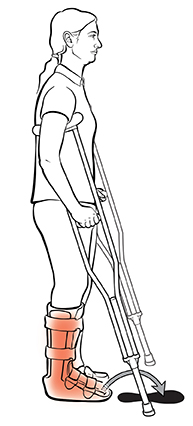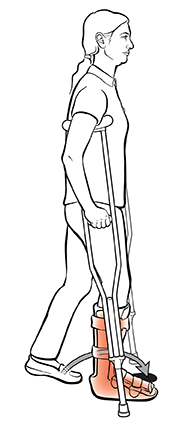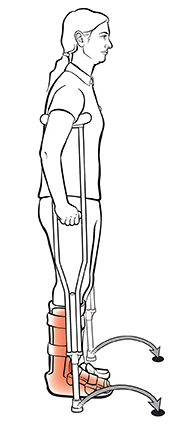Discharge Instructions: Using Crutches (Weight-Bearing)
Your healthcare provider has prescribed crutches for you. A healthy leg can support your body weight, but when you have an injured leg or foot, you need to keep weight off it. Once you are told that you can put some weight on your leg, use a "weight-bearing" method of walking as the leg heals. Depending on your arm strength and balance, you can either "step to" or "step through." Practice will help you learn to step through so that you can cover more ground with each step.
Before you use crutches
Be prepared with the following tips:
-
Remove throw rugs, electrical cords, and anything else that may cause you to fall.
-
Arrange your household to keep the items you need handy. Keep everything else out of the way.
-
Find a backpack, fanny pack, or apron, or use pockets to carry things. This will help you keep your hands free.
Standing with crutches
Use the balanced standing (tripod) position when you start or end a movement. Also use it whenever you're standing for a length of time.
-
Move your crutches in front of you about 12 inches.
-
Find your balance.
-
Be sure not to rest your armpits on the pads.
Walking with crutches
Follow these tips:
-
Start in a balanced standing (tripod) position.
-
Step forward with your affected foot.
-
Land lightly between your crutches.
-
Squeeze the pads against the sides of your chest.
-
Support your weight with your hands and your affected leg.
-
Press down on the hand grips.



Step to
This method includes the following:
-
Lift your unaffected foot and step to the crutches.
-
Land on your unaffected foot, between your crutches.
-
Keep the knee slightly bent.
-
Reach forward and out with the crutches to start the next step.
Step through
This method includes the following:
-
Lift the unaffected foot.
-
Step forward through the crutches.
-
Land on the unaffected foot, with the heel slightly in front of the toe of the other foot.
-
Keep the knee slightly bent.
-
Reach forward and out with the crutches to start the next step.
Follow-up
Make a follow-up appointment as directed by your healthcare provider.
When to call your healthcare provider
Call your healthcare provider right away if you have any of the following:
-
Sudden or increased shortness of breath
-
Sudden chest pain or localized chest pain with coughing
-
Fever above 100.4°F (38°C) or as advised by your healthcare provider
-
Chills
-
Increasing redness, tenderness, or swelling at the incision site or in the injured limb
-
Drainage from the incision or injured limb
-
Opening of the incision or injury
-
Increasing pain, with or without activity